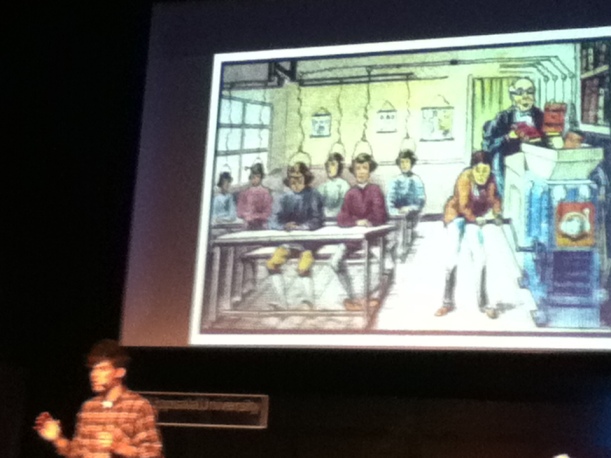I’m just back from the most inspiring event and am desperate to recap before I forget anything important. I uploaded enough TED talks here that you should be familiar with the format, but for those of you who don’t know, TED conferences are dedicated to “ideas worth spreading” surrounding a particular topic. TEDx events are independently organized spin-off conferences and I was fortunate enough to get my hands on a ticket to the event hosted by Uppsala University.
I guess what struck me most was the many different ways that ‘resilience’ can be interpreted. Some speakers took a very personal perspective and talked about their struggles, civic courage and the ability to ‘bounce back’ from misfortune and hardship; others related their story about a universal recipe for happiness (hint: it doesn’t really exist, but dedicating your time to play, social connections, helping others, finding your passion and being grateful seems to help); and others again took more of a system-level perspective.
I’ll focus on the system-level presentations here because they are more related to the blog topic, but I would urge you to check out Brian Palmer’s other TEDx talk here, he is a pretty brilliant professor that lectures on civic courage here at Uppsala University and was voted “best lecturer” at Harvard.
On the system resilience front, we first heard from a young lecturer at CEMUS on the need to revolutionize our economics education. For so much of his talk I was vigorously nodding away, jotting down points like “We can no longer afford ‘economics as usual'”, “incorporate interdisciplinarity“, and “our current economic system is mostly a crisis of collective imagination”.

It’s true that this is what makes me somewhat frustrated with our degree; even as I try to understand neoclassical agricultural economics in order to understand where ag economists are coming from when they suggest certain policies, and considering the fact that I am already in a “liberal” department (considering our classes in environmental economics), the rigidity with which assumptions are presented and the lack of alternative frameworks is infuriating.
Timothee gave a whole dose of recommendations how to improve economics education – embrace alternative theories, respect other methodologies than the “quantitative obsession”, respect other disciplines (history for evidence on how real-world policies played out; psychology for a better understanding of human behavior beyond rationality; and philosophy for a return to the original meaning of economics, what he called the ‘moral science of choice’ rather than the simple ‘quest for efficiency’ that economics is reduced to in today’s world), and use better pedagogical tools that trigger creativity and systems thinking in tomorrow’s economists.
In the end, he gave us all a question to ponder: “how would you redraw the economy if the paper in front of you were blank?” It was a good reminder that the economy is in essence a man-made construct, as much as we like to take it for a given, and that we could organize it in a radically different manner if we so choose – including in order to fit it into our planetary boundaries.
![IMG_0726[1]](http://foodpolicyforthought.files.wordpress.com/2013/09/img_07261.jpg?w=611)
That was basically also the gist of Johan Rockström and Anders Wijkman’s talk who were discussing how to avoid bankrupting nature – this was throwback time for me since I had read (and discussed here) both Rockström’s article on planetary boundaries and had heard Wijkman talk two weeks ago. To be honest, I liked Rockström’s talk (which laid out the problem) but found that Wijkman did not focus enough on practical solutions; rather, he gave us a bullet-point list the length of my arm focusing on anything from reforming institutions, making market prices reflect the real cost of resources, stabilizing population, land use reform to a reform of the financial system (this is literally how he phrased his solutions, giving us no further hints on how to initiate these reforms or price changes).
To the question of what we could do personally to achieve anything, he failed to come up with an answer other than “lobby your politicians for change” and a vague “participate in the circular economy”; I feel the message could have been much more empowering on a personal level (e.g. invest your money in the right place, support companies that do the right thing through buying their products or giving them a leg-up on Kickstarter, engage on a community level in sustainable actions such as foodsharing.de, …)
Actually, a presentation that did give us some more of this go-and-do-good-things perspective was the talk by Filippa Bergin on resilient fund management (also good timing since we just talked about that topic too!) She started by laying out the conventional banking framework – a rigid approach focused solely on growth and trying to avoid taking externalities into account on all costs – and comparing it to an ecosystem – which is based on interactions between its various parts and on continuous adaption and changes based on feedback effects. Her point? Trying to make fund management more like an ecosystem – resilient, based on cyclical growth and degrowth instead of huge bubbles that send the economy in long-lasting recessions – could actually decrease risk and vulnerabilities. Cool idea, huh? I’m not sure about the practicalities though (what does harnessing degrowth actually mean? Just being fine with negative profits for a while?) but I liked the thought. Also, she had by far the coolest slides – they looked hand-drawn!
![IMG_0721[1]](http://foodpolicyforthought.files.wordpress.com/2013/09/img_07211.jpg?w=611)
![IMG_0723[1]](http://foodpolicyforthought.files.wordpress.com/2013/09/img_07231.jpg?w=611)
![IMG_0724[1]](http://foodpolicyforthought.files.wordpress.com/2013/09/img_07241.jpg?w=611)
Plus, Filippa gave us the quote that could sum up the event in my mind when the moderator asked her about the practicalities of changing the financial system from its roots up:
“The only thing we have to change is the way we see the world.”
And that, undoubtedly, is a precondition for any change towards resilience we want to start. So let’s start in our minds!
![IMG_0719[1]](http://foodpolicyforthought.files.wordpress.com/2013/09/img_07191.jpg?w=611)